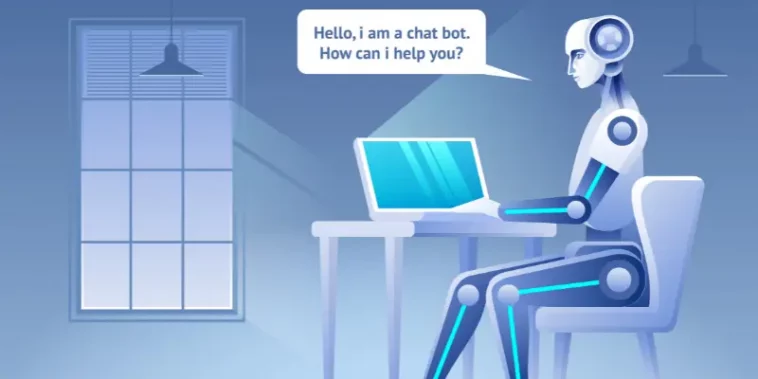In today’s digital product engineering era, AI has revolutionized many aspects of our lives, and chatbots are at the forefront of this transformation. What is a chatbot in AI? Essentially, it’s a computer program designed to simulate conversation with human users, especially over the internet. These bots can answer questions, provide customer support, and even engage in complex interactions, making them invaluable tools for businesses and individuals alike.

History of Chatbots
The concept of chatbots isn’t new. The journey began in the 1960s with ELIZA, a program that mimicked human conversation. Since then, chatbots have evolved significantly, incorporating advanced technologies like AI, Crypto and machine learning to become more sophisticated and useful.
How does Chatbots Work?
At the core of what is a chatbot in AI lies a fascinating blend of technology. Basic chatbots operate on predefined rules, providing responses from a set script. More advanced AI-powered chatbots Use natural language processing (NLP) to interpret and respond to user inputs in a more human-like manner. NLP allows these bots to grasp the context of the conversation, making interactions smoother and more intuitive.
Types of Chatbots
- Rule-Based Chatbots: These follow a set of pre-defined rules and scripts. They are simple but limited in their capabilities.
- AI-Powered Chatbots: These utilize AI and machine learning to understand and respond to user inputs. They are more flexible and capable of handling complex queries.
Key Components of Chatbots
- User Interface: The platform through which users interact with the chatbot.
- Backend Processing: The system that processes user inputs and generates responses.
- Data Storage: Where the chatbot’s knowledge and conversation history are stored.
Applications of Chatbots
Chatbots have found their way into various industries:
- Customer Service: Providing instant support and information.
- Healthcare: Assisting patients with information and appointment scheduling.
- E-commerce: Helping customers find products and make purchases.
- Education: Offering personalized learning experiences and answering student queries.
Benefits of Using Chatbots
The question of what a chatbot is in AI is closely tied to understanding their benefits. Chatbots offer several advantages:
- Improved Customer Experience: Responding quickly and efficiently.
- 24/7 Availability: Chatbots are always ready to help, regardless of the time.
- Cost Efficiency: Reducing the need for a large customer support team.
Challenges Faced by Chatbots
Despite their benefits, chatbots face several challenges:
- Language Understanding Issues: Misinterpretation of user inputs can lead to unsatisfactory responses.
- Handling Complex Queries: Some queries are too complex for current chatbot technology to handle effectively.
Future of Chatbots in AI
The future of chatbots looks promising. Trends indicate that chatbots will become more intuitive and capable of comprehending and responding to a broader variety human emotions and complexities. Improvements in AI technology will only enhance their capabilities.
How to Implement a Chatbot?
Implementing an AI chatbot involves several steps:
- Choosing the Right Platform: Selecting the best platform for your needs.
- Designing Conversations: Crafting responses that feel natural and engaging.
- Testing and Deployment: Ensuring the chatbot works correctly before going live.
Case Studies of Successful Chatbot Implementations
- Example 1: A leading e-commerce company that significantly improved customer satisfaction with a chatbot.
- Example 2: A healthcare provider using chatbots to streamline patient interactions and reduce wait times.
Chatbots vs. Human Support
While chatbots offer many advantages, they cannot completely replace human support. Each has its pros and cons. Chatbots are excellent for routine queries, but human support is necessary for more complex, emotional interactions. Here is the example of chatbots – Candy AI, Spicychat AI and so on.
Ethical Considerations of AI Chatbot
When discussing what is chatbot in AI, it’s crucial to consider ethical issues:
- Privacy Concerns: Ensuring user data is protected.
- Transparency: Users should understand they are working with a chatbot.
Common Misconceptions About Chatbots
- Chatbots Are Not Intelligent: While not all chatbots are highly intelligent, AI-powered ones can be quite sophisticated.
- Chatbots Will Replace Human Jobs: Rather than replacing humans, chatbots often augment human roles, handling and reducing repetitious chores and making time for more complicated work.
In short, what is a chatbot in AI? It’s a powerful tool that leverages AI to simulate human conversation, providing numerous benefits across various industries. Companies, including those specializing in NSFW chatbot development company, are exploring new applications and possibilities. While challenges remain, the future holds great promise for this technology. As chatbots continue to evolve, they will undoubtedly play an even more integral role in our digital interaction.



